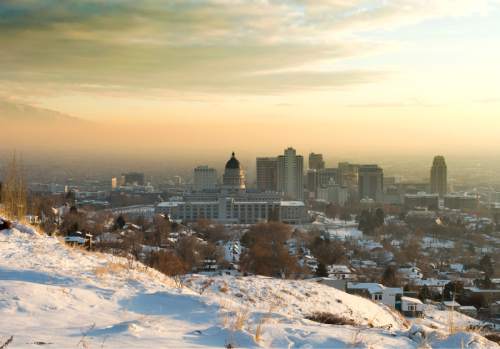This is an archived article that was published on sltrib.com in 2015, and information in the article may be outdated. It is provided only for personal research purposes and may not be reprinted.
On Dec. 1, Salt Lake County had its first no-burn day of the winter. The inversion is settling in, and no storms are predicted for the Wasatch Front before Dec. 13 at the soonest. The county had 23 no-burn days during all of last winter, but this year we may hit that by Christmas.
Call it the advent calendar of death.
Utah Division of Air Quality officials decide no-burn days, and they admit they're trying to be pro-active by declaring one before the air has exceeded federal pollution standards. If they are aggressive in limiting some small but significant contributors like wood burners, it will pay dividends over the entire inversion cycle. What's more, if Utah doesn't reduce the days it exceeds those standards, the state will lose control to some arbitrary federal mandates.
Taken overall, our air quality has improved in recent decades, and there is reasonable expectation that improvements in cars, fuels and building materials can produce more gains. Lifestyle changes — notably more people willing to live in higher density housing and take mass transit — are also helping.
But the optimism is tempered by growing evidence that even small levels of pollutants cause harm, particularly with the young and old. When an extended inversion puts us on the map as one of the most polluted populations in the nation, we need to know that's not just annoyance. It hastens death.
That's how it's always been with air pollution along the Wasatch Front. Feeling forced by the need to maintain a good environment for economic growth, we have accepted a marginal environment for human health, which, of course, is bad for economic growth.
There is temptation to wish the inversion persists into the Utah legislative session, when air pollution usually gets lots of talk but limited action. We've seen it before. If the PM 2.5 at the Capitol is as thick as the lobbyists, there is more impetus to act. Of particular concern this year will be building standards. With the biggest polluter (cars) getting cleaner, the urgency grows to attack the next biggest polluter (buildings). Tightening energy standards on new construction is a long-term win for everyone, but developer-friendly legislators have resisted anything that increases up-front costs of construction.
But that session is almost two months away, and we're already having no-burn days. While we can't control the jet stream, we can stop burning, keep carpooling and otherwise act responsibly, including keeping the pressure on lawmakers to get our priorities straight. For some of us, it really is the gift of life.



